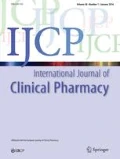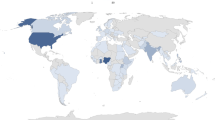Abstract
Background Valid and reliable instruments for measuring knowledge about human immuno-deficiency virus (HIV) among people living with the virus are necessary to identify knowledge gaps and evaluate effectiveness or outcomes of education programmes. However such instruments are scarce, particularly in developing countries. Objective This study aimed to develop and validate a self-administered instrument for measuring HIV-related knowledge among people living with HIV in Nigeria. Setting This study was conducted in the HIV/AIDS clinic of the University of Uyo Teaching Hospital, Akwa Ibom State, Nigeria. Methods The Patient’s HIV Knowledge Questionnaire (PHKQ) items, designed with response choices of ‘yes’, ‘no’ and ‘don’t know’, were developed based on relevant literature and similar published studies. Face and content validity were established. Evidence of construct validity was established by factor analysis and group differences. Factor analysis was done using principal components and varimax rotation with Kaiser Normalization. Estimates of reliability were evaluated using internal consistency approach (with Cronbach’s alpha coefficient) as well as the test–retest method for estimating the stability of the PHKQ scores over time (with Pearson’s r). Main outcome measure Validity/reliability of the Patient’s HIV Knowledge Questionnaire. Result Response rate in this study was 95.0%. Item analysis of the 20-item instrument resulted in the deletion of 5 items; thus the final instrument consists of 15 items. Cronbach’s alpha coefficient for the scale was 0.77, while test–retest reliability was 0.80 (p < 0.001). Factor analysis resulted in 3 components—Transmission and Misconceptions, Causes and Treatment Outcomes, and Diet and Immunity—with Cronbach’s alpha of 0.70, 0.56 and 0.46 respectively. The Patient’s HIV Knowledge Questionnaire differentiated between newly diagnosed (≤ 1 year) individuals and those with at least 10 years since HIV diagnosis, and also between those with only primary education and those who had had up to tertiary education (p < 0.001). Conclusion The Patient’s HIV Knowledge Questionnaire appears to be a valid and reliable tool for assessing HIV-related knowledge among people living with HIV in Nigeria. Further studies are needed to explore the instrument’s responsiveness to change, and to evaluate its psychometrics in different settings.
Similar content being viewed by others
References
HIV.org [Internet]. Washington: U.S. Department of Health and Human Services [updated 2018 Nov 20; cited 2019 May 20]. https://www.hiv.gov/hiv-basics/overview/data-and-trends/global-statistics#page-tools.
Joint United Nations Programme on HIV/AIDS (UNAIDS). AIDS epidemic update [Internet]. 2018 [cited 2019 May 23]. http://aidsinfo.unaids.org/.
National Agency for the Control of AIDS. Nigeria global AIDS response country progress report [Internet]. Abuja: Nigeria. 2015 [cited 2019 May 24]. https://www.unaids.org/sites/default/files/country/documents/NGA_narrative_report_2015.pdf.
Joint United Nations Programme on HIV/AIDS (UNAIDS). 2018 estimates [Internet]. https://www.unaids.org/sites/default/files/media_asset/unaids-data-2018_en.pdf.
Joint United Nations Programme on HIV/AIDS (UNAIDS). 2017 estimates [Internet]. [cited May 24]. http://www.unaids.org/sites/default/files/media_asset/20170720_Data_book_2017_en.pdf.
Carey MP, Schroder KE. Development and psychometric evaluation of the brief HIV knowledge questionnaire (HIV-KQ-18). AIDS Educ Prev. 2002;14:174–84.
Rattray J, Jones MC. Essential elements of questionnaire design and development. J Clin Nurs. 2007;16:234–43.
Davis C, Sloan M, Macmaster S, Hughes L. The international AIDS questionnaire—english version (IAQ-E). J HIV AIDS Prev Child Youth. 2007;7(2):29–42.
Koopman C, Rotheram-Borus MJ, Henderson R, Bradley JS, Hunter J. Assessment of knowledge of AIDS and beliefs about AIDS prevention among adolescents. AIDS Educ Prev. 1990;2:58–70.
Leake B, Nyamathi A, Gelberg L. Reliability, validity, and composition of a subset of the centers for disease control and prevention acquired immunodeficiency syndrome knowledge questionnaire in a sample of homeless and impoverished adults. Med Care. 1997;35:747–55.
Carey MP, Morrison-Beedy D, Johnson BT. The HIV-knowledge questionnaire: development and evaluation of a reliable, valid, and practical self-administered questionnaire. AIDS Behav. 1997;1:61–74.
Mongkuo MY, Thomas R, Lucas N, Taylor A. Development and validation of HIV prevention scale for historically black college students. J AIDS HIV Res. 2012;4(6):165–74.
Sutton MY, Hardnett FP, Wright P, Wahi S, Pathak S, Warren-Jeanpiere JS. HIV/AIDS knowledge scores and perceptions of risk among African American students attending historically black colleges and universities. Public Health Rep. 2011;126(5):653–63.
Govender S, Esterhuizen T, Naidoo P. Impact of Pharmacists’ Intervention on the knowledge of HIV infected patients in a public sector hospital of KwaZulu-Natal. Afr J Prim Health Care Fam Med [Internet]. 2011;3(1):258. https://doi.org/10.4102/phcfm.v3i1.258.
Arunkumar TS, Rajan SI, Thimothy R. HIV Patients: knowledge and sexual behaviour patterns. Econ Political Wkly. 2004;39(12):1208–10.
Olowookere SA, Fatiregun AA, Adewole IF. Knowledge and attitudes regarding HIV/AIDS and antiretroviral therapy among patients at a Nigerian treatment clinic. J Infect Dev Ctries. 2012;6(11):809–16.
Garcia AA, Villagomez ET, Brown SA, Kouzekanani K, Hanis CL. The star country diabetes education study: development of the Spanish-language diabetes knowledge questionnaire. Diabetes Care. 2001;24(1):16–21.
Krosnick JA, Presser R. Question and Questionnaire Design. 2009. https://web.stanford.edu/dept/communication/faculty/krosnick/docs/2009/2009_handbook_krosnick.pdf.
Furr RM, Bacharach VR. Psychometrics: an introduction. 2nd ed. Thousand Oaks: Sage Publications; 2008.
Nunnally JC, Bernstein IH. Psychometric theory. 3rd ed. New York: McGraw-Hill; 1994.
National Bureau of Statistics, Nigeria. Nigeria data portal [Internet]. 2006 [updated 2016 May 31; cited 2019 May 26]. http://nigeria.opendataforafrica.org/xspplpb/nigeria-census.
Federal Ministry of Health [Nigeria]. National HIV/AIDS and Reproductive Health Survey, 2012 (NARHS Plus). Abuja: Federal Ministry of Health. 2013 [cited 2019 May 26]. https://naca.gov.ng/wp-content/uploads/2016/11/NARHS-Plus-2012-Final-18112013.pdf.
Yamane T. Statistics: an introductory analysis. 2nd ed. New York: Harper and Row; 1967.
Price LR. Psychometric methods: theory into practice. New York: The Guilford Press; 2017.
Burns N, Grove SK. The practice of nursing research: conduct, critique and utilization. 5th ed. St Louis: Saunders; 2005.
Leech NL, Barrett KC, Morgan GA. SPSS for intermediate statistics: use and interpretation. 2nd ed. New Jersey: Lawrence Erlbaum Associates, Inc.; 2005.
Streiner DL, Norman GR. Health measurement scales: a practical guide to their development and use. Oxford: Oxford University Press; 1995.
Martins OF, Rampal L, Munn-Sann L, Sidik SM, Othman N, Iliyasu Z, et al. Knowledge and attitudes of adult HIV positive patients to HIV/AIDS in Yola, Nigeria. J Public Health Epidemiol. 2015;7(7):241–8.
Federal Ministry of Health [Nigeria]. Nigeria HIV/AIDS Indicator and Impact Survey (NAIIS), 2018. National Summary Sheet: Preliminary findings. Abuja: Federal Ministry of Health. 2019 [cited 2019 Nov 13]. https://www.naiis.ng/resource/factsheet/NAIIS%20PA%20NATIONAL%20FACTSHEET%20FINAL.pdf.
Acknowledgements
The authors are grateful to Dr John Ekott, the coordinator of the HIV clinic, UUTH; Dr Obazee, the physician in charge of the HIV clinic, UPTH; our research assistants—Helen N., Ebere O., Margaret O. and Idongesit V., as well as all the patients who responded to the survey.
Funding
None
Author information
Authors and Affiliations
Corresponding author
Ethics declarations
Conflicts of interest
None declared.
Additional information
Publisher's Note
Springer Nature remains neutral with regard to jurisdictional claims in published maps and institutional affiliations.
Electronic supplementary material
Below is the link to the electronic supplementary material.
Appendix
Appendix
The patients’ HIV knowledge questionnaire (PHKQ)
Item | Correct answer |
|---|---|
Causes and treatment outcomes | |
1. HIV infection is caused by bacteria | No |
2. HIV infection is caused by evil spirits | No |
3. HIV infection can be cured after taking HIV drugs for a long time | No |
4. Viral load greater than 1000 copies/mL is bad | Yes |
5. Drugs for HIV cause a decrease in viral load | Yes |
Transmission and misconceptions | |
6. Coughing and sneezing do not spread HIV | Yes |
7. Someone who is taking drugs for HIV cannot transmit HIV to another person if he/she engages in risky behaviours (for example, unprotected sex, sharing needles) | No |
8. Everyone who has HIV also has AIDS | No |
9. Exercise is not safe for people living with HIV | No |
10.When viral load result shows that the level of HIV is not detectable in the blood of an HIV positive individual, drugs for HIV can be discontinued | No |
11. An HIV positive individual on drugs for HIV does not need to take the drugs everyday if there are no major symptoms | No |
12. Laboratory tests are not necessary to tell whether my drugs are working or not | No |
Diet and immunity | |
13. CD4 count less than 100 cells/µL is good for a person with HIV | No |
14. If a person with HIV infection does not take drugs for HIV, his/her CD4cell count will continue to decrease | Yes |
15. The diet of a person with HIV consists mostly of special foods | No |
Rights and permissions
About this article
Cite this article
Jackson, I.L., Okonta, J.M. & Ukwe, C.V. Development and psychometric evaluation of the patient’s HIV knowledge questionnaire (PHKQ). Int J Clin Pharm 42, 695–702 (2020). https://doi.org/10.1007/s11096-020-00963-z
Received:
Accepted:
Published:
Issue Date:
DOI: https://doi.org/10.1007/s11096-020-00963-z




